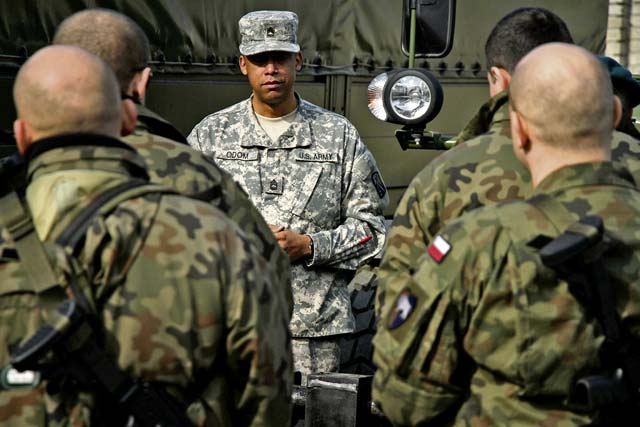
OPOLE, Poland — It was a brisk morning at the Opole garrison where U.S. Soldiers stepped into a red-bricked building and shook hands with Polish Land Forces officers saying, “Dzień Dobry,” meaning, “good morning,” in Polish.
Three U.S. Army logisticians from the 16th Sustainment Brigade, 21st Theater Sustainment Command visited the Polish Land Forces 10th Logistics Brigade, or BLog, to train Transport Support Movement Team soldiers on logistical operations Feb. 24 to 28.
The 10th BLog will deploy under the NATO International Security Assistance Forces in support of Operation Enduring Freedom. Their mission revolves around retrograde operations for Polish Land Forces military supplies.
“We are a specific unit that has supported troops in Afghanistan, Chad, Mali, Iraq and Kosovo with all types of movement — air, rail, wheeled and sea transport. Our task in Afghanistan this time is to send equipment back to Poland,” said Polish Land Forces Lt. Col. Wojciech Grygbowski, 10th BLog TSMT commander.
U.S. Army soldiers Chief Warrant Officer 3 Sulaimen Bah, supply system technician, Sgt. 1st Class Charles Odom, senior wheeled vehicle mechanic, and 1st Lt. Henry Chan conducted classes teaching the Polish troops cargo preparation techniques, mechanical inspections, hazardous material documentation, U.S. Customs inspections, and aerial and ground transportation operations.
In general, the mission of retrograde operations is to displace logistical supplies to a secure location to reorganize and redistribute. Such operations have increased during the past two years of the Afghan war to recover and reorganize U.S. government property in the battlefield.
The three American Soldiers deployed to Afghanistan in 2012 and 2013 under the CENTCOM Materiel Recovery Element. The Soldiers were executed retrograde operations in Afghanistan.
“This is great cooperation and very important for us to maintain close cooperation with U.S. transport Soldiers,” Grzybowski said. “We need to broaden our knowledge in these operations. Our logistics operations are similar, but we have different procedures.”
One of the American instructors who helped train Grzybowski’s unit was Bah, who served as an accountable officer at a retrograde sort yard in Kandahar, Afghanistan. He operated a 90-person retro-sort facility that received, sorted and shipped U.S. government equipment recovered from the southern portion of Afghanistan.
“It was successful training. (The Polish troops) will most likely save time on researching and planning for these operations,” Bah said. “This type of training will also cut down on any potential damage to our aircrafts and vehicles from improper (cargo preparation) techniques.”
Polish Land Forces Capt. Bartek Jasiulewicz, 10th BLog TSMT operations officer, is a transportation officer who has worked extensively with aerial cargo delivery and U.S. Air Force cargo standards.
“It is important for us to develop these procedures together as well as we have a lot of current and future joint operations,” Jasiulewicz said.
Both the 16th SB and the 10th BLog are planning future partnership training after the Polish Soldiers’ return from retrograde operations in Afghanistan.







